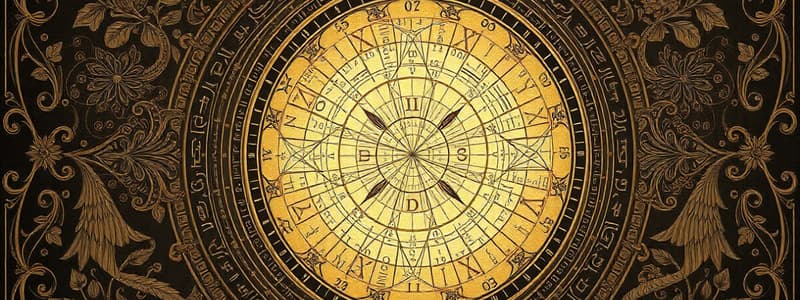Podcast
Questions and Answers
What is the primary focus of algebra in mathematics?
What is the primary focus of algebra in mathematics?
- The use of symbols to represent numbers and quantities (correct)
- The study of shapes and their properties
- The investigation of rates of change
- The collection and analysis of data
Which of the following operations is NOT a part of arithmetic?
Which of the following operations is NOT a part of arithmetic?
- Addition
- Differentiation (correct)
- Multiplication
- Subtraction
What is studied within the branch of statistics?
What is studied within the branch of statistics?
- Logical proofs
- Shapes and angles
- Data collection and analysis (correct)
- Change and motion
Which branch of mathematics deals with limits and integrals?
Which branch of mathematics deals with limits and integrals?
The concepts of area and volume are fundamental to which branch of mathematics?
The concepts of area and volume are fundamental to which branch of mathematics?
Which statement is true regarding prime numbers?
Which statement is true regarding prime numbers?
Which of the following describes mathematical modeling?
Which of the following describes mathematical modeling?
Which branch of mathematics specifically studies properties of integers?
Which branch of mathematics specifically studies properties of integers?
What type of mathematics deals with countable structures?
What type of mathematics deals with countable structures?
In what way can algebra generalize arithmetic statements?
In what way can algebra generalize arithmetic statements?
Flashcards
What is mathematics?
What is mathematics?
The study of numbers, quantities, and shapes, involving logic, patterns, and relationships.
What is arithmetic?
What is arithmetic?
The basic branch of mathematics focusing on numbers and their properties, including addition, subtraction, multiplication, and division.
What is algebra?
What is algebra?
A branch of mathematics using symbols for numbers and quantities, dealing with equations, inequalities, and variables.
What is geometry?
What is geometry?
Signup and view all the flashcards
What is calculus?
What is calculus?
Signup and view all the flashcards
What is statistics?
What is statistics?
Signup and view all the flashcards
What are proofs in mathematics?
What are proofs in mathematics?
Signup and view all the flashcards
What is abstract algebra?
What is abstract algebra?
Signup and view all the flashcards
What is number theory?
What is number theory?
Signup and view all the flashcards
What is discrete mathematics?
What is discrete mathematics?
Signup and view all the flashcards
Study Notes
Introduction to Mathematics
- Mathematics is a science that deals with numbers, quantities, and shapes.
- It involves the study of logic, patterns, and relationships.
- Mathematics has many branches, including arithmetic, algebra, geometry, calculus, and statistics.
Arithmetic
- Arithmetic is the basic branch of mathematics.
- It deals with numbers and their properties.
- Operations in arithmetic include addition, subtraction, multiplication, and division.
- Arithmetic also includes concepts like prime numbers, factors, and multiples.
Algebra
- Algebra is a branch of mathematics that uses symbols to represent numbers and quantities.
- It deals with equations and inequalities.
- It allows us to generalize arithmetic statements.
- Examples: solving equations ( x + 2 = 5), manipulating formulas, and understanding variables.
Geometry
- Geometry involves the study of shapes and their properties.
- It includes figures like lines, angles, triangles, quadrilaterals, circles, and three-dimensional shapes.
- Concepts such as area, perimeter, volume, and surface area are fundamental in geometry.
- Different branches within geometry include Euclidean geometry and non-Euclidean geometry.
Calculus
- Calculus involves the study of change and motion.
- It consists of differential calculus (rates of change) and integral calculus (accumulation of quantities).
- Key concepts include limits, derivatives, integrals, and applications to problems involving motion, optimization, and areas.
Statistics
- Statistics is a branch of mathematics that deals with data collection, analysis, interpretation, presentation, and organization.
- It uses methods like probability to draw conclusions and make predictions.
- Crucial in making sense of data in various fields, including science, business, and social sciences.
Other Important Mathematical Concepts
- Logic: An essential aspect of mathematical reasoning.
- Proofs: Demonstrations of mathematical statements' truth using logical arguments.
- Problem-solving: A crucial skill in mathematics.
- Patterns and relationships: Identifying and analyzing patterns in mathematical data.
- Mathematical modeling: Representing real-world problems using mathematical equations and tools.
- Abstract algebra: A branch that studies algebraic structures like groups, rings, and fields.
- Number theory: Focuses on properties of integers.
- Discrete mathematics: Deals with countable or discrete structures.
Studying That Suits You
Use AI to generate personalized quizzes and flashcards to suit your learning preferences.




